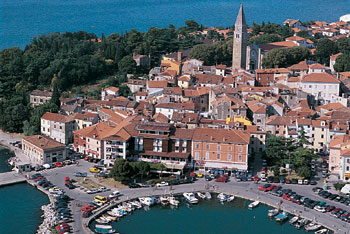
Isola
Will Slovenian Cinematography Survive?
To understand the film industry of a country, it requires defining certain concepts of nation and statehood, and placing them in a context which is historical, political, and geographical. It also requires knowledge of history and cinema history in much wider sense. For the last ten years, film critics from Slovenia have announced a genuine crises their small domestic filmmaking industry.
For years, there have been rumors about the bad quality of Slovenian film, about the fading of Slovenian cinematography. Nevertheless, this small former Yugoslavian film industry still has potential; the pulse might be weak, but it still beats.
Proof came in the form of the annual International Film Festival in Isola (a.k.a the Kino Otok — Isola Cinema Festival) on the coast of Slovenia. As film lovers and filmmakers converged on the city, even a post-civil-war climate of political malaise, with war criminals being arrested and an economic crises threatening, it seems that Slovenian film may not be in such a bad shape and even may, with a little help, weather the storm in the Balkans. From innovative European films to big-budget movies, there were films to suit different tastes. Evening screenings took place in a charming little square in Isola’s Old Town, with various tracks focusing on unknown and unexplored cinematography with new aesthetics — in other words, the poetics of film — focusing on African, Asian and Latin American films.
The Kino Otok — Isola Cinema Festival was founded in 2004 with the help of the IFFI International Film Festival in Innsbruck, Austria, which sends student volunteers from the University of Innsbrook to assist. Helmut Groschup, the director of the Innsbrook Film Festival, serves on the festival board, along with Slovenian film director Vlado Škafal and other notable members of the Balkan film community. Škafal’s latest film, Father, is not a classic feature film but discusses, according to Škafal, the material of reality. Father has screened at several European film festivals.

Jan Cvitkovic
Another Slovenian filmmaker who was important both to this festival and to Slovenian cinematography is, without any doubt, Jan Cvitkovic. Just think of this: what is art in a post-socialism society but the art of crisis, entropy, provocation and cynicism? All of these can be found in the work of Jan Cvitkovic (especially if we talk about provocation and cynicism on film). To the American public, this archeologist-become-filmmaker is best known for his 2005 film Gravehopping (Odgrobadogroba), which screened at multiple U.S. film festivals and won some international awards, so it is just possible that you have seen it somewhere. Gravehopping deals with a deaf-mute woman, S&M sex, brass music, a bizarre death, and the oddness of local funerals in a story truly inspired by the collective unconsciousness of Slav cinematography. The film is a commentary on auto-destruction, told through the narrative poetry of a gallery of characters worthy of Federico Fellini. It is very similar to the old Yugoslavian films of so-called black wave of the ‘70s, made during the communist period. Black wave films in former Yugoslavia were films prohibited by the communist government, due to the content of films which railed against the communist dogma.
Cvitković is currently shooting a new film called Arheo.
Isola Film Festival Today
From June 8 to 12, the Kino Otok – Isola Cinema featured a wide selection of films along with educational programs. Cinephiles could celebrate film at the seaside in this international festival of African, Asian, Latin American and Eastern European cinema. Films were screened at the Odeon Art Cinema, Culture Hall and, of course, the cinema under the stars: the Otok Open-air Cinema at Manzioli Square. Every evening, the screenings took place under the starry sky, accompanied by the lively program Video on the Beach, which presented the works of non-yet-established and Slovenian filmmakers.
The official film programs included the Harvest (competition program of the festival, shown in the open air cinema on the Manzioli square), Masters (selection of the latest films by established masters of cinematography of “four continents”), Friends (film choices of the international program committee members), Special Occasion (complementary program of the competition section) and New Shores (retrospectives of national or continental cinematography in the cooperation of Slovenian Cinematography.) One of the most attractive part of the festival was the Lighthouse Cinema, which took place on a beautiful Izola beach next to the town’s lighthouse, offering night projections in an unofficial program. At night participants could visit Night Beach for festival clubbing with an open program, a perfect gathering point at the end of the day.


